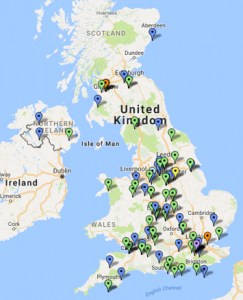Co-authored by Clare Killen
 Over one hundred universities, colleges and other providers are piloting the Jisc Digital discovery tool in the UK and overseas. The design of this tool encourages individuals to reflect on and develop their digital capabilities. It provides a summary of their self-assessment in response to nuanced question prompts as well as suggestions for further development with links to relevant, interactive resources. Whilst it is very much a personal tool, additional features allow institutional leads tasked with supporting digital capabilities development to gain insights from anonymised data and translate them into the institutional context.
Over one hundred universities, colleges and other providers are piloting the Jisc Digital discovery tool in the UK and overseas. The design of this tool encourages individuals to reflect on and develop their digital capabilities. It provides a summary of their self-assessment in response to nuanced question prompts as well as suggestions for further development with links to relevant, interactive resources. Whilst it is very much a personal tool, additional features allow institutional leads tasked with supporting digital capabilities development to gain insights from anonymised data and translate them into the institutional context.
Jisc team members have visited several pilot institutions to support the implementation process. In doing so, and through our in-depth conversations, we have learned about what works, at a practical level, when it comes to providing opportunities to develop the digital capabilities of staff and students in the various organisations. Further insights have emerged from conferences, events and meetings featuring presentations from our pilots, for example, the Student Experience Experts meeting and the Digital capabilities session at Digifest18.
As the roll-out gathers pace, we are starting to gain some fascinating insights into how institutions are using the opportunities offered by this tool to bring about positive change in their organisations. There are some clear themes emerging around what organisations that are benefiting from the Digital discovery process typically have in place:
1. Clear strategic vision
We are seeing that the organisations with a clear message about the importance of digital technologies, communicated and understood by everyone, provides a meaningful context for the use of the discovery tool.
“It is important to have a clear strategy and people need to know that digital is part of the strategy and part of what they do. You need to engage people in it, allow them to see how it affects them and why it is important to them. It needs to be exciting, so for example, we have run several big events that inspire and excite people around the idea of using technology to support teaching and learning and the college business.”
Penny Langford, head of e-learning, Milton Keynes College
2. Culture
Having a safe space in which teams can explore their thinking about their own priorities for development creates an environment in which individuals can thrive.
“The individual reports which each member of my team had, generated discussions and comparisons, with staff considering their different roles and how that has had an impact upon their individual percentage. More than that though, it made them consider how they might acquire skills where they didn’t score as highly. I have eLearning Technologists and Librarians in my team and each had different scores, particularly the Information Literacy category. Which prompted all manner of discussion around the fake news agenda and critically evaluating information sources.”
Sarah Crossland, academic services manager, Doncaster College and University Centre
3. Connections
Establishing the connections between individual self-identified aims, the overall picture for all staff and the resources available to support professional development to meet organisational strategic aims.
We wanted to identify gaps in staff confidence in their digital skills and use this information to target staff training and support. We looked at other products but there was nothing really out there to meet those requirements. We were looking for a standardised tool and wanted something to self-motivate staff. The approach taken by the Digital discovery tool supports that.
Joseph Pilgrim, digital learning co-ordinator, ACT Training
Digital capability community of practice
The next digital capability community of practice event is being hosted in partnership with the University of Leicester on 22 May 2018. This provides an opportunity to learn about related initiatives and hear more from the wider community including many members who are taking part in the pilot of Digital discovery tool.
While registration for this event has now closed, the keynote sessions will be live streamed. Follow the hashtag #digitalcapability on the day and presentations and any outputs will be available from the event page.
There is still time to engage staff
If you are part of the pilot, you still have time to engage staff, perhaps through end of term staff development events. Remember that feedback is required by the end of May but the Digital discovery tool will continue to be available until 13 July 2018.
